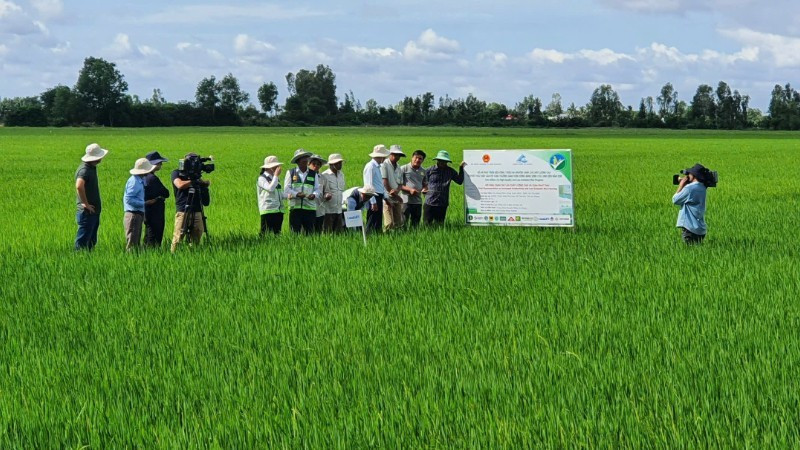In recent years, rice production in the Mekong Delta has faced major challenges due to increasingly complex climate change impacts, including drought, saline intrusion and unusual flooding. At the same time, traditional farming practices that rely on high volumes of seeds, fertilisers and pesticides have raised production costs, caused environmental pollution, and increased greenhouse-gas emissions.
Meanwhile, export markets are placing greater emphasis on quality, food safety, and emission-reduction standards. This requires Viet Nam’s rice sector to undergo a fundamental shift towards concentrated, sustainable, high-quality, and low-emission production.
In 2024 and 2025, the National Agricultural Extension Centre has coordinated with localities and relevant units to implement seven pilot models of high-quality, low-emission specialised rice farming in the Mekong Delta. Following three crop cycles, the models have shown production-cost reductions of 8.2% to 24.2% compared to control models by reducing seed use by 30% to 50%.
Hoang Tuyen Phuong, Head of the Crop Cultivation and Forestry Extension Division, National Agricultural Extension Centre
On November 27, 2023, the Prime Minister issued Decision No. 1490/QĐ-TTg approving the project on sustainable development of one million hectares of high-quality, low-emission specialised rice farming associated with green growth in the Mekong Delta by 2030. This strategic project aims to restructure rice production, raise farmers’ incomes, and affirm Viet Nam’s role and responsibility in fulfilling international commitments on reducing greenhouse-gas emissions.
To implement the project, the agricultural extension system and community-based extension groups play a pivotal role as frontline forces accompanying farmers, cooperatives, and enterprises in organising production, transferring technology, reducing emissions, and building the brand of Vietnamese rice.
According to Hoang Tuyen Phuong, Head of the Crop Cultivation and Forestry Extension Division (National Agricultural Extension Centre): “In 2024 and 2025, the Centre has coordinated with localities and relevant units to implement seven pilot models of high-quality, low-emission specialised rice farming in the Mekong Delta. Following three crop cycles, the models have shown production-cost reductions of 8.2% to 24.2% compared to control models by reducing seed use by 30% to 50%, fertiliser use by 30 to 70 kg/ha, irrigation water by 30% to 40%, and pesticide spraying by one to four applications. Yields increased by 2.4% to 7.0%, incomes rose by 12% to 50%, equivalent to 4 to 7.6 million VND/ha compared with control models; greenhouse-gas emissions decreased by 2 to 12 tonnes of CO₂/ha, and post-harvest straw burning was significantly reduced, helping limit environmental pollution.”
In addition, the pilot models, agricultural-extension projects, and Public-Private Partnership (PPP) cooperation initiatives have clearly demonstrated effectiveness, helping farmers reduce costs and increase yields. Nguyen Truong Vuong, representative of Bayer Vietnam Co., Ltd., said the company has implemented the Bayer ForwardFarming model to support the goal of cultivating and sustainably developing one million hectares of high-quality, low-emission specialised rice farming associated with green growth in the Mekong Delta. Under this model, productivity is maintained or increased by 0.6% to 13.5%, production costs reduced by an average of 10% to 25%, profits increased by 13.1% to 74.16%, seed use cut by 50% to 70%, nitrogen fertiliser reduced by 30% to 50%, and greenhouse-gas emissions lowered by 13.7% to 24.7% CO₂.
The National Agricultural Extension Centre reported that the country currently has 5,187 community-based agricultural extension groups with 47,493 members. In the Mekong Delta alone, there are more than 1,000 groups with nearly 11,000 members. These community-based extension groups are helping transfer technical advances, provide advisory support for developing cooperatives, guide farmers in reorganising production, building raw-material zones, and connecting enterprises to purchase farmers’ products.
However, as newly established organisations, they have yet to operate smoothly; the number of effective community-based agricultural extension groups remains low, with activities still largely spontaneous or formalistic; the capacity of community-based extension staff remains limited and does not yet meet task requirements; facilities and operational resources are insufficient; and following the implementation of the two-tier local government model, the operation of community-based extension groups has been disrupted.
These achievements are contributing to shifting rice production in the Mekong Delta towards sustainable green production. To effectively implement the project going forward, Hoang Tuyen Phuong, Head of the Crop Cultivation and Forestry Extension Division, stated it is necessary to standardise procedures for model implementation; strengthen PPP cooperation; boost communication activities; enhance digital transformation and training of trainers (ToT); and promote technology transfer and raw-material-zone development.
At the same time, it is essential to strengthen training and capacity building for community-based extension groups and organise communication activities to raise awareness of community-based agricultural extension and foster a professional workforce; coordinate with enterprises and cooperatives under a multi-value, co-development approach; and prioritise funding for training, workshops, and capacity-building activities for extension workers, especially community-based extension groups, focusing on low-emission rice-farming techniques, communication skills, community mobilisation, and emission monitoring.
















